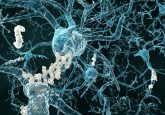Journal Watch: Proximity to amyloid plaques disrupts glutamate transport in Alzheimer’s disease

In a recent study, Hefendehl and colleagues at the University of British Columbia (Vancouver, Canada) assessed the pathological changes to extracellular glutamate induced by amyloid plaques in a model of Alzheimer’s disease (AD). The group reported in Nature Communications that the microenvironment surrounding amyloid plaques disrupts neuronal glutamate homeostasis. This disruption in turn may explain the excitotoxicity and neuronal death observed in AD. The extracellular accumulation of amyloid plaques is a pathological hallmark of AD responsible for a number of neuronal and glial malfunctions. Previous research has demonstrated that proximity to amyloid plaques is associated with excitotoxicity, decreased spine density...




